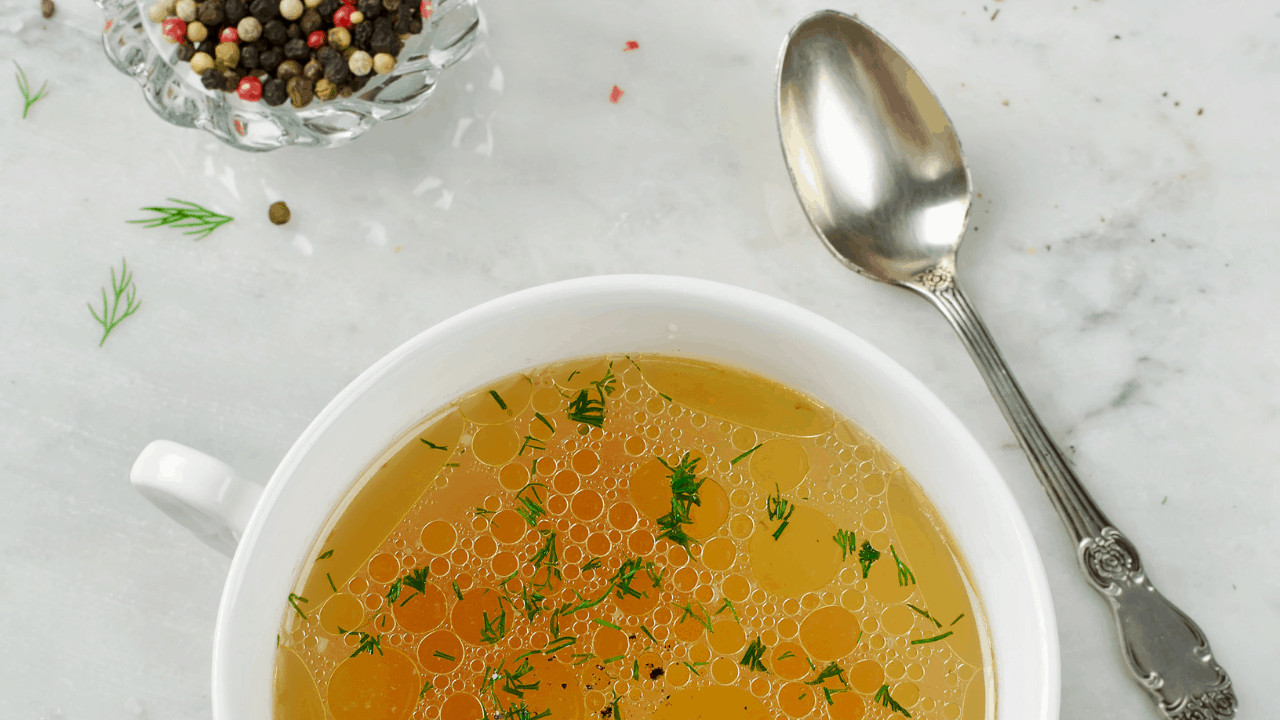
Bone broth has seen a huge increase in popularity in recent years – and with good reason. With its unique nutritional content and delicious flavor, drinking bone broth every day may help provide incredible health benefits.
But as with all health supplements, finding a balance of how much to drink to support optimal health is important. While drinking too much bone broth every day may not be particularly harmful, it’s helpful to know what to expect from consuming larger amounts. In this article, we will look at the benefits of bone broth and dive in on how much to drink. We will also discuss the risks of drinking too much.
How Much Bone Broth Should You Drink Daily?
The amount of bone broth to drink daily will vary depending on a person’s unique health needs and goals, as well as a host of other factors.
There are no specific guidelines for bone broth consumption. For general health, drinking about 2 cups of bone broth a day is enough to reap nutritional rewards. However, if the bone broth is salted, drinking more than a few cups a day can boost sodium levels above the recommended daily allowance.
For more specific health goals and needs, however, drinking more cups of bone broth daily might be the way to go. We have listed some benefits that are tied back to bone broth consumption.
Gut Health
If you are drinking bone broth to help with gut function or “leaky gut”, the general recommendation is to consume two cups daily. If using a powdered bone broth supplement, one serving per day will do the trick. Remember, these are general guidelines that come from internet searching, as bone broth is not a regulated food item, but rather a general term for something that could be made of multiple ingredients.
A majority of your immune system cells are located in and around your gut, so promoting optimal gut health can help to protect your body against other diseases. However, there are NO scientific studies to show a direct relationship between drinking bone broth and promoting gut health.
Joint Protection and Cartilage Repair
Despite claims that drinking between two to four cups of bone broth daily may help to protect joints, lessen joint pain, and help cartilage repair adequately, the jury is still out. If joint pain is particularly acute, try an even higher intake than this to start with, and then reduce as time goes on.
If using a powdered supplement, try 1-2 servings a day. Now, remember that research does not show that consuming bone broth directly correlates to collagen absorption. Additionally, scientific research shows that different brands actually contain different amounts of amino acids. So, be careful what you read.
Weight Loss
To support general weight loss and to boost protein intake, drinking two cups of bone broth a day may help to keep cravings at bay. This is because drinking bone broth helps to keep you feeling full (similar to drinking water before a meal). However, before starting any sort of diet or relying on bone broth as a key way to lose weight, it’s best to consult a medical professional or registered dietitian to find out your options.
Consuming bone broth as part of the bone broth diet takes a slightly different strategy. On fasting days, aim to drink six cups of bone broth per day. In supplement form, this is three servings a day. Remember, we do not recommend fasts as a way to lose weight, but if it’s something you are interested in, speak to a dietitian or medical professional first to learn more.
What is In Bone Broth Anyway?

Bone broth is a liquid that’s made by simmering animal bones and connective tissues in water for hours or days. The nutritional content of the bones and ligaments infuses with the liquid, making a powerful broth that’s packed with vitamins, protein, and unique nutrients. Bone broth can also be made with vegetables along with the bones, and currently, there is no regulation as to what bone broth must actually contain. Research does show that the amino acid content is varied greatly over different brands, so it’s best to read the labels to find out which broth contains the most nutrition.
Typically, bone broth is consumed as a supplement to meals – but can also be a meal replacement in certain diets. It also exists in capsule and powder form for more convenient consumption. Additional ingredients can be added to homemade bone broth, such as herbs, spices, and vegetables, which help make it especially tasty as bone broth on its own can be a bit bland. If you rather not bother making bone broth at home, we have curated a list of the best-premade bone broth on the market.
Why Should You Drink Bone Broth?
Bone broth contains high levels of magnesium, calcium, zinc, and phosphorus, all essential to the functioning of our bodies; it’s important to know that most of these nutrients come from the addition of vegetables, rather than from the bones themselves. It also has great iron content and provides us with a source of vitamin A and K – and, if making bone broth with additional vegetables, these can also add extra health benefits, meaning that it’s a great source of nutrition.
Some people even swap their daily coffee out for bone broth, as an alternative morning drink that gives a different kind of energy boost.
Also, simmering the bones and ligaments means that bone broth contains collagen, which provides the body with essential amino acids. However, as we previously stated, different brands contain vastly different amino acid profiles, meaning that you might have to do a little research to find one that provides more benefits than others.
Amino acids have huge benefits as they’re the building blocks of protein, and can provide us with anti-inflammatory effects and a range of other benefits.
Collagen is also a valuable ingredient in the support of skin, nail, and hair health, and is a popular component of many beauty treatments – meaning that with bone broth, it’s rejuvenating from the inside out! However, direct consumption of collagen does not translate to absorption; surprisingly, vegetables are a better source of collagen compounds; which means that adding vegetables to bone broth could help to increase collagen consumption and absorption.
While bone broth can be a great addition to diets for the general support of good health, it also has health benefits that may help people with more specific needs. These may include:
Helps With Gut Health

In particular, those suffering from a leaky gut may find that drinking bone broth daily helps to alleviate symptoms and improve gut function due to its collagen content (if made with vegetables). Collagen can fortify the lining of the gastrointestinal tract, leading to better gut health. If gut problems are a concern, bone broth could be a great help.
Can Help With Joint Pain

The gelatin in bone broth can be very beneficial for joint health. Gelatin intake has been found to increase collagen in body tissue, which can lead to less joint pain and trouble, which occurs over time through aging or adding extra stress to joints through sporting activity.
In addition to the collagen ingested through drinking bone broth, other ingredients like glucosamine and chondroitin in the broth can help to alleviate joint pain and support joint health.
Can Support Weight Loss Goals

Bone broth can also be used to support weight loss. Its high protein content means that it contributes to feeling satiated for longer periods, and can help stop people from consuming excess calories. Its levels of protein also mean it’s a great choice for those looking to build more muscle. Drinking bone broth also increases your fluid consumption, which could especially be helpful for preventing dehydration, especially in the winter.
For those looking to use bone broth for more targeted weight loss, the bone broth diet is a plan that cycles five days of a paleo diet with two days of fasting while only consuming bone broth. Its delicious flavor and nutritional profile mean it could be a better choice than other diet drinks out there. Please remember that the Bone Broth diet was created by a naturopathic practitioner, and is not backed by any science. We also do not recommend fasts as a way to lose weight.
Is Bone Broth Just Hype?
While bone broth seems to be the latest new superfood offering extraordinary health benefits, the general concept of bone broth has been around for centuries, used by cooks across the world in meals. The process of making bone broth is very similar to making cooking stock, meaning that it may feel familiar and have people wondering why people are suddenly making a big deal out of it.
It is undeniable that bone broth can be a nutritious drink and contains protein along with beneficial nutrients… The fad Bone Broth diet along with numerous miracle claims has no doubt skyrocketed its popularity, and a quick search at your local grocery store will yield multiple results. However, it’s easy to make at home and should be consumed with caution. There is such a thing as too much of a good thing.
Is Too Much Bone Broth Bad For You?
While bone broth is full of healthy features, it still begs the question: is it possible to drink too much, and what happens if I do?
One thing to think about is the sodium intake of bone broth. If the bone broth is salted, drinking more than a few cups a day can boost sodium levels above the recommended daily allowance – so make sure that any bone broth being consumed is not full of salt. This could lead to increased blood pressure, heart rate, or edema (swelling of the arms or legs). Another consideration is the unintended extra ingredients that can come from the bones themselves. Animal bones contain small traces of toxic metals such as lead, which are poisonous when consumed in high quantities. In this respect, drinking too much bone broth could cause unwanted side effects. However, you may need to drink a lot to become poisoned by the lead from the broth.
Additionally, bear in mind that long-cooked bone broth contains naturally occurring glutamates, which in high quantities may cause headaches, seizures, and ironically leaky gut – for which bone broth is one of the most traditional alternative treatments! To counteract this, when making homemade bone broth, it may help to follow a recipe with a shorter cooking time.
Conclusion
Bone broth has been around for centuries and has quickly become a mainstream addition to many people’s diets. It does offer some nutritional benefits but probably won’t do everything that the internet claims it will; do your research before relying on bone broth to fix what ails you.
Also, before consuming too much bone broth, check the ingredients or make your own with no added salt to help prevent consuming too much sodium.








